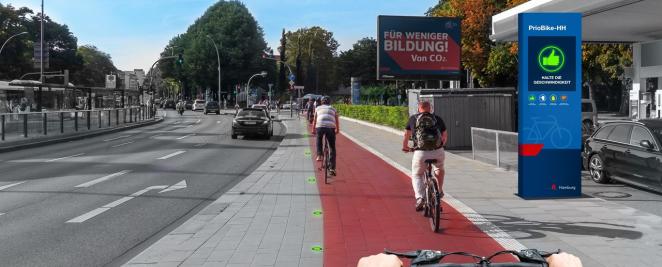
As a proactive step toward modernizing traffic planning and enhancing the integration of bicycle traffic data into existing models, the city has joined the MegaBITS project. This initiative also aims to incorporate traffic safety information into the urban traffic data architecture. To achieve these objectives, the City of Hamburg, in collaboration with MegaBITS, will embark on the development of four pilots on Intelligent Transportation System (ITS) for Cycling.
These pilots consist of the following:
Data Connector and Infrastructure Planning Support
Currently the City of Hamburg lacks a system that combines diverse data sources and lacks automated data processing capabilities, resulting in restricted data sharing with other services. This pilot aims at establishing a mechanism for the automatic aggregation and integration of data from various sources. This information will subsequently be utilized to enhance the bicycle infrastructure, including the implementation and improvement of green waves for cyclists. Ultimately, this effort aims to bolster EcoMobility in the city.
Traffic Models
The primary goal of the second pilot is to improve integration of bike traffic representation into existing traffic models and integrate traffic data into urban traffic data architecture. Currently, there is limited inclusion of bike-related data in the urban data platform, and the use of a Bike-Agent in traffic simulations is non-existent.
Through these efforts, the city aims to improve the accuracy of bicycle traffic approximation, accommodating the specific needs of cyclists. This will facilitate improved planning for roadworks, ultimately enhancing comfort and safety for bicycle users, among other benefits.
PrioBike Improvements
Adjusting traffic lights can be rather challenging and is not always possible at all intersections. Recognising such limitation, for this reason previously the City of Hamburg developed the PrioBIKE app. The app was designed to enhance cyclists' commutes and increase the appeal of cycling by offering a Green Light Optimal Speed Advisory (GLOSA). The objective was to establish a digital green wave for cyclists at various routes and intersections.
The GLOSA feature is achieved by merging predicted green time information with the cyclist's location, speed, and direction of travel. This integration allows the calculation of both a minimum and maximum speed. Following the minimum speed recommendation ensures that cyclists reach the end of the green phase just before the traffic light turns red.
In the MegaBITS project, the City of Hamburg seeks to further refine the PrioBike app. The goal is to promote cycling by minimising the instances where cyclists are stationary at red lights, thereby optimizing their travel experience.
Intermodal Trips
A significant number of bicycle trips are a result of the community's need to commute to commute to public transportation hubs, such as train or bus stations. With the fourth implementation the City of Hamburg aims to analyse and improve the intermodal connection between public transport and bicycle trips. To accomplish this, the city plans to gather data from intermobility trips, such as calculations of the time required to reach the platform from bike parking and identify strategies to reduce these durations.
Crucially, this has the potential to increase the attractiveness of cycling for intermodal trips by improving predictability and lessening dependence on cars. In turn, reducing the time and uncertainty associated with commuting between bicycle and public transport.